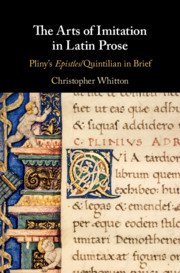Book contents
- The Arts of Imitation in Latin Prose
- The Arts of Imitation in Latin Prose
- Copyright page
- Dedication
- Epigraph
- Frontispiece
- Contents
- Ad lectorem
- Quintilian in Brief, in Brief
- Abbreviations
- Chapter 1 Two Scenes from the Life of an Artist
- Chapter 2 Setting the Stage
- Chapter 3 Brief Encounters
- Chapter 4 Dancing with Dialectic
- Chapter 5 Through the Looking-Glass
- Chapter 6 On Length, in Brief (Ep. 1.20)
- Chapter 7 Letters to Lupercus
- Chapter 8 Studiorum secessus (Ep. 7.9)
- Chapter 9 Docendo discitur
- Chapter 10 Reflections of an Author
- Chapter 11 Quintilian, Pliny, Tacitus
- Chapter 12 Beginnings
- References
- Index locorum
- Index of Greek and Latin Words
- General Index
Chapter 8 - Studiorum secessus (Ep. 7.9)
Published online by Cambridge University Press: 10 June 2019
- The Arts of Imitation in Latin Prose
- The Arts of Imitation in Latin Prose
- Copyright page
- Dedication
- Epigraph
- Frontispiece
- Contents
- Ad lectorem
- Quintilian in Brief, in Brief
- Abbreviations
- Chapter 1 Two Scenes from the Life of an Artist
- Chapter 2 Setting the Stage
- Chapter 3 Brief Encounters
- Chapter 4 Dancing with Dialectic
- Chapter 5 Through the Looking-Glass
- Chapter 6 On Length, in Brief (Ep. 1.20)
- Chapter 7 Letters to Lupercus
- Chapter 8 Studiorum secessus (Ep. 7.9)
- Chapter 9 Docendo discitur
- Chapter 10 Reflections of an Author
- Chapter 11 Quintilian, Pliny, Tacitus
- Chapter 12 Beginnings
- References
- Index locorum
- Index of Greek and Latin Words
- General Index
Summary
Epistles 7.9 is an acme of ‘Quintilian in Brief’. Advising young Fuscus how to study during his summer vacation, Pliny rewrites Quintilian’s advice on written exercises (Institutio 10.5), offering a firm riposte to his views on poetry in a virtuosic leçon par l’exemple of textual imitatio. Besides drawing eclectically on Institutio 10 and 11, the letter reaches through windows to Cicero’s De oratore and Pro Archia, pursues Quintilian’s imitations of Seneca the Elder and – in a paroxysm of self-referentiality – appropriates Tacitus’ Dialogus to describe Pliny’s own prose style. An excursus on Epistles 4.14 shows that Quintilian is inscribed into Pliny’s ‘poetry’ letters from the beginning – and that Catullus is far more present in these pages than has been supposed.
Keywords
- Type
- Chapter
- Information
- The Arts of Imitation in Latin ProsePliny's <I>Epistles</I>/Quintilian in Brief, pp. 272 - 322Publisher: Cambridge University PressPrint publication year: 2019

